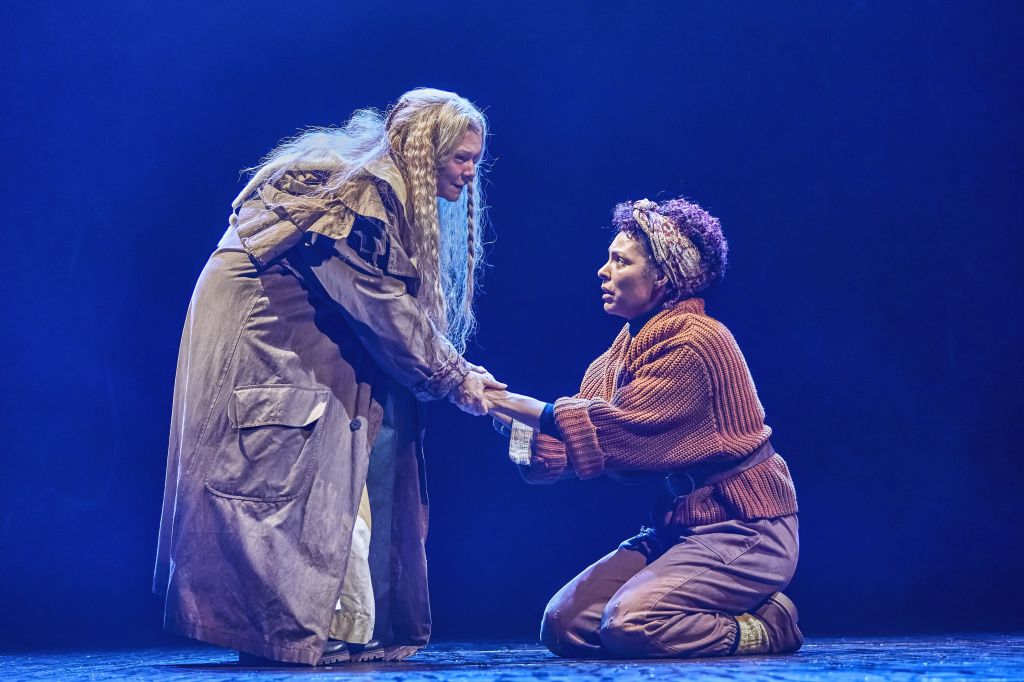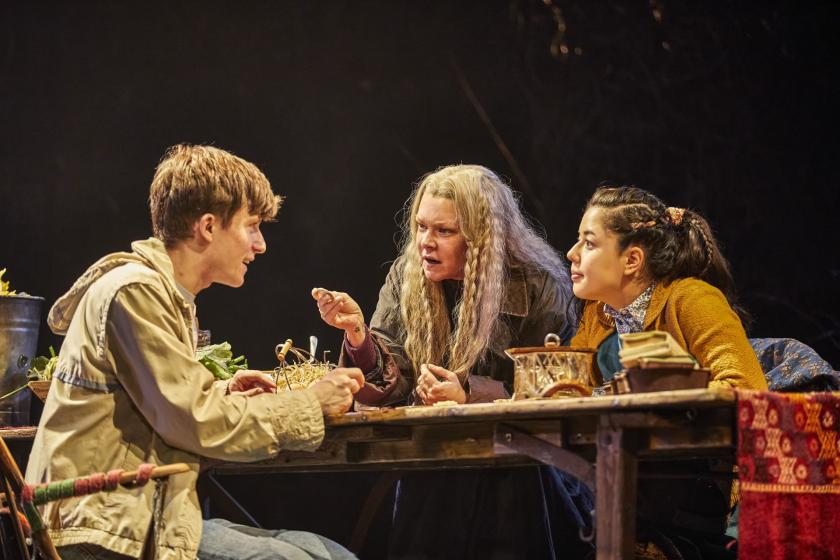There were shrieks, gasps, and nervous laughter in the Nöel Coward Theatre during press night of a kind rarely heard in the theatre. The startled cries marked the triumphant return of Joel Horwood’s adaptation of Neil Gaiman’s magical novel, first seen at the National Theatre in 2019 and now returning to the West End after a long tour.
An exploration of the liminal space between memory and imagination, the play focuses on a young, unhappy boy: friendless, distressed by the absence of his mother, frustrated by his father’s attempts to look after him and his sister – burnt toast anyone? – and more immediately shocked by the discovery of the suicide of their lodger in the back of their car. Keir Ogilvy’s nerdy lad (he is never given a name) initially finds solace in reading the classic fantasy novels, but later explores beyond his familiar surroundings and goes to the end of the lane where the mysterious Hempstocks live. Will they help him confront his fears?
 Is it his unhappiness that creates the Hempstock family, three generations of ageless women, including the youngish Lettie (a formidable Millie Hikasa) who introduces him to a fantasy life that stretches back to the beginning of time? In the warmth of their kitchen, Finty Williams’s Old Mrs Hempstock not only recalls the birth of the moon but also knows the details of the lodger’s suicide. It’s an imaginative world that is brilliantly brought to life in Katy Rudd’s eye-popping production. Taken in hand (literally) by Lettie, the Boy enters a glittering, dark thicket in which the branches of the trees are knitted together (designer Fly Davis) and a duck pond becomes an ocean. A huge spider-like creature with several shrieking skeletal heads rises up out of the ground to the sound of Jherek Bischoff’s pulsating score. No wonder people were ducking their heads. It is no less frightening because one can see the puppeteers expertly manipulating the body. This is a show in which illusions and magical tricks – cups appearing out of nowhere - sit side by side with powerful appeals to the imagination.
Is it his unhappiness that creates the Hempstock family, three generations of ageless women, including the youngish Lettie (a formidable Millie Hikasa) who introduces him to a fantasy life that stretches back to the beginning of time? In the warmth of their kitchen, Finty Williams’s Old Mrs Hempstock not only recalls the birth of the moon but also knows the details of the lodger’s suicide. It’s an imaginative world that is brilliantly brought to life in Katy Rudd’s eye-popping production. Taken in hand (literally) by Lettie, the Boy enters a glittering, dark thicket in which the branches of the trees are knitted together (designer Fly Davis) and a duck pond becomes an ocean. A huge spider-like creature with several shrieking skeletal heads rises up out of the ground to the sound of Jherek Bischoff’s pulsating score. No wonder people were ducking their heads. It is no less frightening because one can see the puppeteers expertly manipulating the body. This is a show in which illusions and magical tricks – cups appearing out of nowhere - sit side by side with powerful appeals to the imagination.
Firmly instructed to hold onto Lettie’s hand, the vulnerable Boy nevertheless lets go and is quickly attacked. Back home, the consequences are revealed as a giant, yucky worm emerges out of his hand. Then his father introduces their new lodger, the saccharine Ursula (Charlie Brooks). While she endears herself to Dad and the Boy’s sister, he is all too aware that she is an evil monster in an attractive woman’s clothing. Or is it that he doesn’t like the fact that his father and Ursula are getting too close? Locked in enmity with this ruthless intruder, he is thwarted in his attempts to reach the Hempstock farmhouse by her ability to turn up in the most unexpected of places. Doors spin and Ursula switches impossibly between them.
It's not all visual magic, the emotional heart of the story emphasised at the beginning and end in which the Boy has grown into a Man (played by Trevor Fox, who also plays Dad) coming back to the area to attend his father’s funeral. He is drawn to the duck pond for reasons he can’t explain. Memories, it seems, are elusive and painful. Does he have the courage to confront his demons as he looks back on a life which hasn’t turned out as he imagined? Old Mrs Hempstock is there for a moment of encouragement and then disappears.
It would be hard to overplay the extent to which this is a team effort - in particular, the choreography of the ensemble who move the furniture around and seamlessly hand the actors the props with the most delicate of timing (when they are not grappling with Lettie in the woods as the Hunger Monsters). Two years ago, when theatres had reopened but Covid was still rampant, I saw a very ragged, underwhelming performance of this show, presumably undermined by sickness among the whole company. And so it is a huge pleasure to see it currently playing at full strength.
Young adult theatre is enormously popular these days, and the best of it appeals to adults too. War Horse, Life of Pi, The Curious Incident of the Dog at Night-time, and The Ocean at the End of the Lane are all strong stories that are visually exciting and appeal to the imagination. After a year-long tour, Ocean's current return is brief. Do yourself a favour and catch it while you can.















Add comment